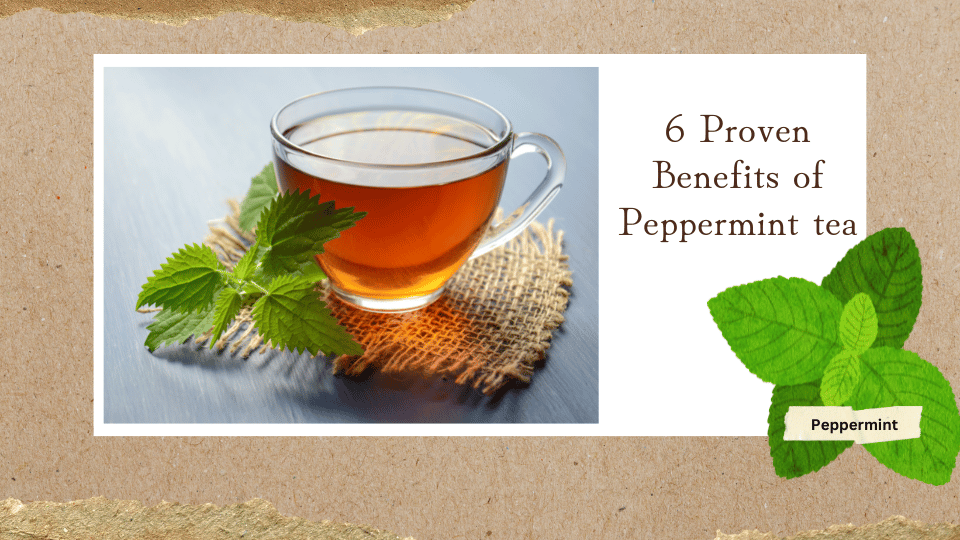There are proven benefits of peppermint tea, and it includes: Energize your body, fortifying your immune system and increasing your overall health.
Peppermint tea is a popular beverage that is known for its ability to help people relax and unwind. The calming effect of peppermint is due to the presence of menthol, which may be found in peppermint plants.
It has been known to decrease blood pressure and reduce muscular tension, making peppermint tea a natural approach to soothe the aches and pains associated with muscle tension and aches. In addition to this, it is an excellent source of antioxidants, which protect the body from the harm caused by free radicals.
Table of Contents
What is a Peppermint Tea?
Peppermint tea is naturally sweet, caffeine-free, and low in calories. It may also be connected to a variety of health advantages, including the ability to aid digestion, increase attention, alleviate migraines, and freshen your breath.
Peppermint is a mint family aromatic herb that is a hybrid between watermint and spearmint. Peppermint flavoring is used in breath mints, sweets, and other meals. In addition, many individuals drink peppermint tea as a pleasant, caffeine-free beverage.
Benefits of Peppermint Tea

It may help to freshen your breath
Peppermint is a popular flavoring for toothpaste, mouthwashes, and chewing gum for a reason. Peppermint has antibacterial treatment that help fight microorganisms that produce dental plaque, which may help improve your breath.
In one study, persons who had spine surgery and had a rinse including peppermint, tea tree, and lemon oils reported better breath symptoms than those who did not receive the oils.
In another 2013 study, female students given a peppermint mouth rinse had better breath after one week than the control group.
While there is no scientific evidence that drinking peppermint tea has the same impact, peppermint components have been demonstrated to enhance breath.
Sinus congestion may be relieved
Antibacterial, antiviral, and anti-inflammatory effects are found in peppermint. As a result, the benefits of peppermint tea may help to clear congested sinuses caused by infections, the common cold, and allergies.
Furthermore, some previous study shows that menthol, one of the active chemicals in peppermint, increases the feeling of airflow in the nasal cavity. As a result, the steam from peppermint tea may make you feel as if your breathing is easier.
Though the effects of peppermint tea on nasal congestion have not been explored, evidence suggests that it may be beneficial.
Energy levels may improve as the benefits of peppermint tea
One of the benefits of peppermint tea is that it may boost energy and alleviate weariness. While no trials on peppermint tea have been conducted, research indicates that natural chemicals in peppermint may have energy-boosting properties.
In another study, peppermint oil aromatherapy was found to be more helpful than a placebo in reducing fatigue in persons admitted to a cardiology facility.
Benefits of peppermint tea helps you to concentrate
Peppermint tea is an excellent study companion. One of the benefits of peppermint tea includes boosting attention in addition to being a strange combination of relaxing and invigorating.
In one short study, 24 young individuals performed better on exams after consuming peppermint oil. According to other research, peppermint oil may increase attentiveness.
Benefits of peppermint tea includes calming an upset stomach

Peppermint has been used to treat gastrointestinal ailments from the beginning of time. Bloating, gas, a sensitive stomach, nausea, irritable bowel syndrome (IBS). This is supported by scientific evidence for peppermint oils and extracts. So, you can also check the benefits of flaxseed.
Another 2020 research of women undergoing breast cancer chemotherapy discovered that those who got 20 milliliters of peppermint extract-infused water every 8 hours had less nausea and vomiting than those who did not.
Benefits of peppermint tea helps in menstrual discomfort
One of the benefits of peppermint tea is that it utilizes peppermint items to relieve flow cramps or pelvic pain.
According to a 2016 study, using peppermint oil reduced the discomfort and length of menstrual cramps. According to 2018 research, consuming peppermint capsules may help reduce period pain.
Peppermint is a good source of:
Potassium
Calcium
Vitamin A
Vitamin C
Folate
Peppermint also includes antioxidants known as flavonoids. These antioxidants serve to protect your cells from free radical damage, which may reduce your risk of premature aging and chronic diseases.
The Risks of Peppermint Tea
In large doses, the menthol in peppermint might have negative side effects. While it is difficult to overdose on menthol by drinking peppermint tea, it is not advised for persons with certain health concerns.
Before including peppermint tea into your diet, consult with your doctor about the following issues:
Heartburn
Peppermint can aid digestion and relieve stomach pain, but it can also aggravate acid reflux. Peppermint should be avoided if you suffer from gastroesophageal reflux disease (GERD).
Interactions between medications
Certain drugs may be affected by peppermint. It should not be used with cyclosporine, a medication used by organ transplant recipients. It may also lessen the effect of medications that are processed in the liver or treatments that decrease stomach acid.
Kidney Stones
Although peppermint may aid in kidney function, it is not recommended for patients who have kidney stones.
Pregnancy Concerns

Pregnant women who drink peppermint tea have no negative effects, according to research. However, because this has not been thoroughly researched, consult your doctor before consuming the herbal beverage while pregnant.
Making Homemade Peppermint Tea

Peppermint tea bags can be found in a variety of health and supermarket stores. However, with simply peppermint leaves and boiling water, people may rapidly create fresh peppermint tea at home.
To prepare peppermint tea at home, follow these steps:
- In a pot, combine 2 cups of water.
- Bring the water to a boil, then remove it from the heat.
- To the water, add four or five ripped peppermint leaves.
- Cover the saucepan and steep the leaves for 5 minutes or until desired.
- Pour the tea into a mug.
FAQs
Is peppermint tea good before bed?
Peppermint has been discovered to have a relaxing effect, working as a relaxant that helps the mind and body wind down, so drinking peppermint tea before bed can truly help you destress and relax.
Are there any negative effects of peppermint tea?
Mint tea is generally safe to consume and has few negative side effects. Some people, however, may develop stomach distress, heartburn, or diarrhea. If you notice any of these negative effects, drink it with or after meals.
Is it good to drink peppermint tea everyday?
The answer is both yes and nor. Yes, because several health advantages have been associated with peppermint tea. It can aid digestion, alleviate stomach distress and nausea, lessen heartburn symptoms, and even reduce inflammation in the digestive tract. No, since while peppermint tea is typically safe for most individuals, certain safety issues must be addressed.
Conclusion
There are countless benefits of peppermint tea. Besides tasting good, peppermint can help calm an upset stomach and reduce gas, diarrhea, and heartburn. It can also help to treat nausea and vomiting.
Peppermint is also good for the skin and can in fact, be used as a skin toner. If you experience acne, use a cleanser with peppermint oil in it. If you have sensitive skin, mix a small amount of the oil with your regular face wash.
By taking a bath with some peppermint oil mixed into the water it can relieve tired, strained muscles and improve circulation.

